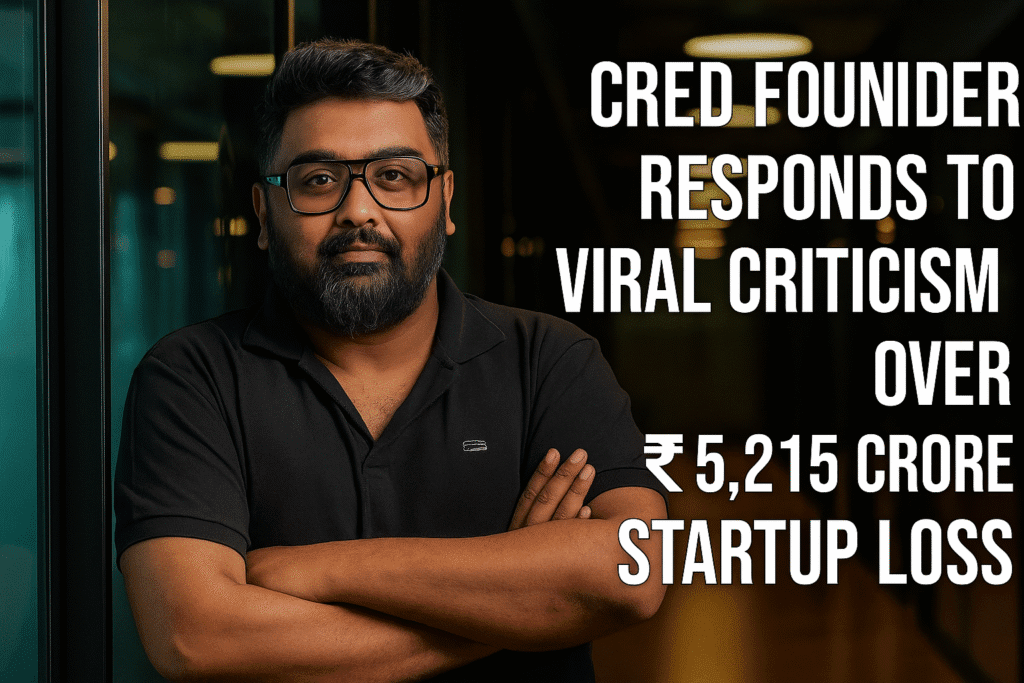New Delhi: A scathing LinkedIn post by Deloitte senior consultant Adarsh Samalopanan has ignited a massive debate in India’s startup ecosystem, questioning why entrepreneur Kunal Shah continues to be celebrated despite accumulating massive losses across his ventures over 15 years.
The controversy centers around Shah’s track record with Freecharge and CRED, which together have reportedly generated significant losses while failing to achieve profitability in over a decade of operations.
The Numbers That Sparked Outrage
Freecharge’s Financial Journey:
- Founded in 2010, earned ₹35 crore revenue by 2015
- Posted ₹269 crore losses due to aggressive cashback strategy
- Sold to Snapdeal for ₹2,800 crore in 2015
- Later sold to Axis Bank for just ₹370 crore in 2017
CRED’s Loss-Making Streak:
- Launched in 2018 as premium credit card payment platform
- Generated ₹4,493 crore total revenue over seven years
- Accumulated net losses of ₹5,215 crore during the same period
- Yet to report a single profitable quarter
Deloitte Consultant’s Viral Critique
Adarsh Samalopanan’s LinkedIn post questioned the startup ecosystem’s hero worship, stating: “Fifteen years into entrepreneurship, he has yet to record a single profitable financial year — so remind me again why we celebrate him?”
The post highlighted concerns about:
- Sustained cash burn without clear profitability path
- Investor wealth destruction
- Setting wrong precedents for young entrepreneurs
Kunal Shah’s Measured Response
Rather than deflecting criticism, Shah responded with surprising candor on LinkedIn:
“The critique is fair. Startups built with external funding don’t need celebration. There are entrepreneurs who have created highly profitable businesses without any outside investment.”
Shah emphasized the importance of risk-taking in the AI era, adding: “Being a job seeker is going to be more risky. We need more job creators.”
Industry Divided: Two Schools of Thought
The Profitability Camp: Supporters of the critique argue that sustainable businesses must eventually generate profits. They point to:
- Investor capital preservation
- Market stability concerns
- Need for realistic business models
The Innovation Camp: Shah’s defenders highlight his contributions to India’s digital payments revolution:
- Freecharge pioneered mobile recharge convenience
- CRED gamified credit card payments
- Both platforms influenced user behavior significantly
Market Impact vs. Financial Performance
Freecharge’s Legacy:
- Simplified mobile recharge process
- Introduced cashback culture in India
- Paved way for digital payment adoption
- Influenced competitors like Paytm
CRED’s Innovation:
- Targeted affluent credit card users
- Created premium payment experience
- Introduced reward-based payment system
- Built India’s first credit-focused super app
Expert Opinions: The Startup Profitability Debate
Industry veterans remain split on the issue:
Supporting Profitability Focus: “Valuation without revenue sustainability is concerning. The 2015 valuations seem inflated in hindsight,” commented a senior venture capitalist.
Defending Innovation Investment: “Amazon was unprofitable for years. Real success isn’t just about black ink—it’s about who dares to redefine market rules first,” argued a startup mentor.
The Broader Startup Ecosystem Question
This debate reflects larger questions facing India’s startup ecosystem:
Traditional Business Model:
- Focus on unit economics
- Sustainable growth rates
- Conservative expansion strategies
Venture-Backed Model:
- Rapid market capture
- Network effects prioritization
- Long-term profitability planning
CRED’s Current Market Position
Despite losses, CRED maintains significant market presence:
- Over 7 million active users
- Premium brand positioning
- Diverse revenue streams development
- Strong investor backing
Lessons for Future Entrepreneurs
The controversy offers several takeaways:
For Aspiring Entrepreneurs:
- Balance growth with sustainability
- Understand investor expectations
- Plan clear profitability roadmaps
For Investors:
- Evaluate long-term business viability
- Consider market impact alongside returns
- Support realistic growth timelines
The Path Forward
Shah’s acknowledgment of criticism demonstrates maturity in leadership. The debate highlights need for:
- Balanced evaluation metrics
- Realistic business planning
- Sustainable growth strategies
Conclusion: Redefining Startup Success
The Kunal Shah controversy forces the startup ecosystem to examine its success metrics. While innovation and market disruption remain important, the debate emphasizes that sustainable profitability cannot be indefinitely deferred.
As India’s startup ecosystem matures, finding the right balance between disruptive innovation and financial prudence becomes crucial for long-term success.

